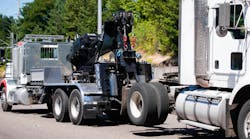Owner-operators and small-fleet trucking business owners in California have fired another salvo in the almost two-year-long legal skirmish challenging the constitutionality of California diesel engine regulations.
Last week the California Construction Trucking Assn. (CCTA) filed a Notice of Appeal to the United States Court of Appeals for the Ninth Circuit that challenges the CARB heavy-duty, on-road truck and bus regulation that will ultimately mandate the forced replacement of diesel-powered commercial motor vehicles that do not meet 2010 EPA emissions standards.
Current rules are forcing either the replacement of engines or retrofitting of equipment with diesel particulate filters (DPF’s) that can cost upwards of $20,000 per vehicle.
“Despite claims used to justify this regulation by regulators and environmental groups that public grant funding is readily available to assist truckers in complying — this is not true,” according to CCTA. “Small-business truckers are bearing the brunt of the multi-billion dollar expense to unnecessarily replace trucks originally built and certified to U.S. EPA emissions standards.”
The CCTA originally filed litigation against CARB’s diesel engine regulation in March 2011, stating the regulation is pre-empted by the Federal Aviation Administration Authorization Act (FAAAA), which prohibits states from enacting any law, rule, or regulation affecting the routes, price, or services of motor carriers.
Environmental activists intervened in the case presenting a legal argument that CARB’s regulation was not actually a state regulation but effectively a federal regulation when the U.S. EPA hurriedly approved the California State Implementation Plan (SIP) in 2012 that contained the challenged truck and bus regulation — nearly a year and a half after litigation began.
In December 2012, the U.S. District Court for the Eastern District of California issued a decision stating that the U.S. EPA was an “indispensable party” to the litigation resulting from EPA approval of the SIP and that the court could no longer retain jurisdiction. No decision was made on the merits of CCTA’s original legal argument, which CCTA said will ultimately open the door for other states to adopt CARB’s diesel engine regulations if CCTA loses.
Besides the Notice of Appeal to the Ninth Circuit, the CCTA said it will also proceed with an Original Petition to the Ninth Circuit challenging U.S. EPA’s approval of the California SIP containing the heavy-duty, on-road truck and bus rule as a violation of the FAAAA and a commerce clause violation of the U.S. Constitution. The Clean Air Act (CAA) does not grant authority to U.S. EPA to regulate in-use engines, CCTA contended.
Separately, the CCTA is being represented by the Pacific Legal Foundation in another action challenging the process used by the U.S. EPA in approving CARB’s off-road diesel engine rules.
In an open letter to the trucking industry titled “Why We Should Continue to Fight,” CCTA stated:
“Our case is the only active legal challenge to the truck and bus rule, which threatens the future of all small and medium-sized motor carriers and bus company owners in the state — and the rule will be adopted by other states if our case is unsuccessful. If we are successful in this litigation, it will open the door to challenges of all the other California diesel regulations, so the stakes are too high to be ignored.”
CCTA warned that truckers “can’t just forget all the reasons behind our litigation and let CARB and EPA keep taking our equipment based on junk ‘science’ claims.
“We have continually exposed the fraud and corruption within the academic and public agency health community and their ‘science’ that is the justification behind this government taking of our once-valuable equipment,” CCTA stated.
“The Clean Air Act charges the EPA with setting air pollution health standards and subsequent enforcement of those standards. But this means that federal and state regulators decide when their own jobs are finished as those standards are met. Not surprisingly, no matter how clean the air, the EPA and CARB continues to find ‘unacceptable risks.’
“The EPA and state regulators’ powers and budgets, as well as most environmental groups … depend on a continued public perception that there is a serious problem to solve with our air and environment. These same regulators are the major funders of the health effects research intended to demonstrate the need for more regulation,” CCTA contends.
“They provide millions of dollars (public funds) each year to environmental groups and unfortunately, corrupt academic researchers who then use the money to augment public fear of every imaginable pollutant (real or not) and then seek increases in regulators’ powers — especially through our court system. These conflicts of interest largely explain the ubiquitous exaggeration of air pollution levels and risks, even as air quality and related public health has dramatically improved.”
To see the complete CCTA open letter to the trucking industry visit http://calcontrk.org/industry/carb/1027-cdtoa-vs-arb


